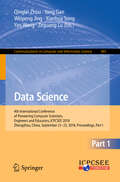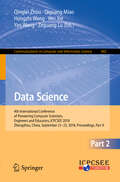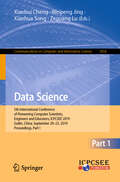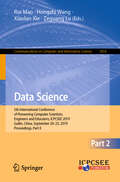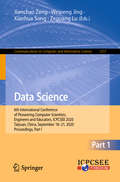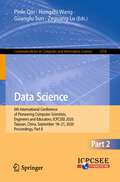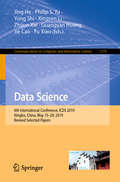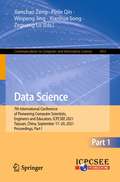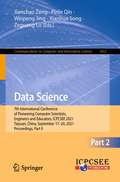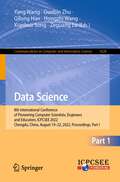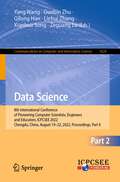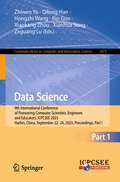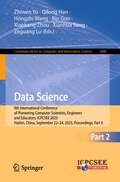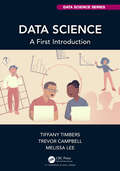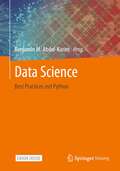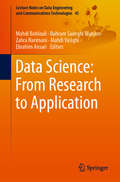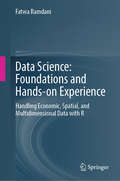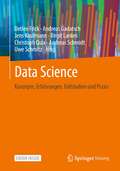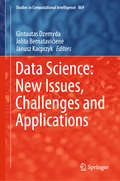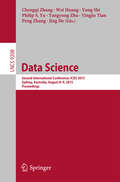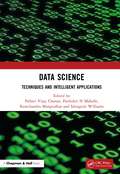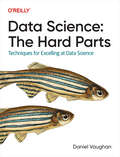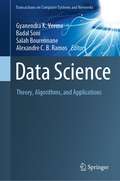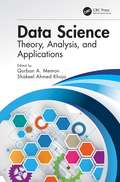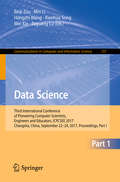- Table View
- List View
Data Science: 4th International Conference of Pioneering Computer Scientists, Engineers and Educators, ICPCSEE 2018, Zhengzhou, China, September 21-23, 2018, Proceedings, Part I (Communications in Computer and Information Science #901)
by Yan Wang Weipeng Jing Xianhua Song Zeguang Lu Yong Gan Qinglei ZhouThis two volume set (CCIS 901 and 902) constitutes the refereed proceedings of the 4th International Conference of Pioneering Computer Scientists, Engineers and Educators, ICPCSEE 2018 (originally ICYCSEE) held in Zhengzhou, China, in September 2018. The 125 revised full papers presented in these two volumes were carefully reviewed and selected from 1057 submissions. The papers cover a wide range of topics related to basic theory and techniques for data science including mathematical issues in data science, computational theory for data science, big data management and applications, data quality and data preparation, evaluation and measurement in data science, data visualization, big data mining and knowledge management, infrastructure for data science, machine learning for data science, data security and privacy, applications of data science, case study of data science, multimedia data management and analysis, data-driven scientific research, data-driven bioinformatics, data-driven healthcare, data-driven management, data-driven eGovernment, data-driven smart city/planet, data marketing and economics, social media and recommendation systems, data-driven security, data-driven business model innovation, social and/or organizational impacts of data science.
Data Science: 4th International Conference of Pioneering Computer Scientists, Engineers and Educators, ICPCSEE 2018, Zhengzhou, China, September 21-23, 2018, Proceedings, Part II (Communications in Computer and Information Science #902)
by Yan Wang Hongzhi Wang Zeguang Lu Wei Xie Qinglei Zhou Qiguang MiaoThis two volume set (CCIS 901 and 902) constitutes the refereed proceedings of the 4th International Conference of Pioneering Computer Scientists, Engineers and Educators, ICPCSEE 2018 (originally ICYCSEE) held in Zhengzhou, China, in September 2018. The 125 revised full papers presented in these two volumes were carefully reviewed and selected from 1057 submissions. The papers cover a wide range of topics related to basic theory and techniques for data science including mathematical issues in data science, computational theory for data science, big data management and applications, data quality and data preparation, evaluation and measurement in data science, data visualization, big data mining and knowledge management, infrastructure for data science, machine learning for data science, data security and privacy, applications of data science, case study of data science, multimedia data management and analysis, data-driven scientific research, data-driven bioinformatics, data-driven healthcare, data-driven management, data-driven eGovernment, data-driven smart city/planet, data marketing and economics, social media and recommendation systems, data-driven security, data-driven business model innovation, social and/or organizational impacts of data science.
Data Science: 5th International Conference of Pioneering Computer Scientists, Engineers and Educators, ICPCSEE 2019, Guilin, China, September 20–23, 2019, Proceedings, Part I (Communications in Computer and Information Science #1058)
by Weipeng Jing Xianhua Song Zeguang Lu Xiaohui ChengThis two volume set (CCIS 1058 and 1059) constitutes the refereed proceedings of the 5th International Conference of Pioneering Computer Scientists, Engineers and Educators, ICPCSEE 2019 held in Guilin, China, in September 2019. The 104 revised full papers presented in these two volumes were carefully reviewed and selected from 395 submissions. The papers cover a wide range of topics related to basic theory and techniques for data science including data mining; data base; net work; security; machine learning; bioinformatics; natural language processing; software engineering; graphic images; system; education; application.
Data Science: 5th International Conference of Pioneering Computer Scientists, Engineers and Educators, ICPCSEE 2019, Guilin, China, September 20–23, 2019, Proceedings, Part II (Communications in Computer and Information Science #1059)
by Hongzhi Wang Zeguang Lu Xiaolan Xie Rui MaoThis two volume set (CCIS 1058 and 1059) constitutes the refereed proceedings of the 5th International Conference of Pioneering Computer Scientists, Engineers and Educators, ICPCSEE 2019 held in Guilin, China, in September 2019. The 104 revised full papers presented in these two volumes were carefully reviewed and selected from 395 submissions. The papers cover a wide range of topics related to basic theory and techniques for data science including data mining; data base; net work; security; machine learning; bioinformatics; natural language processing; software engineering; graphic images; system; education; application.
Data Science: 6th International Conference of Pioneering Computer Scientists, Engineers and Educators, ICPCSEE 2020, Taiyuan, China, September 18-21, 2020, Proceedings, Part I (Communications in Computer and Information Science #1257)
by Weipeng Jing Xianhua Song Zeguang Lu Jianchao ZengThis two volume set (CCIS 1257 and 1258) constitutes the refereed proceedings of the 6th International Conference of Pioneering Computer Scientists, Engineers and Educators, ICPCSEE 2020 held in Taiyuan, China, in September 2020. The 98 papers presented in these two volumes were carefully reviewed and selected from 392 submissions. The papers are organized in topical sections: database, machine learning, network, graphic images, system, natural language processing, security, algorithm, application, and education.The chapter “Highly Parallel SPARQL Engine for RDF” is available open access under a Creative Commons Attribution 4.0 International License via link.springer.com.
Data Science: 6th International Conference of Pioneering Computer Scientists, Engineers and Educators, ICPCSEE 2020, Taiyuan, China, September 18-21, 2020, Proceedings, Part II (Communications in Computer and Information Science #1258)
by Hongzhi Wang Guanglu Sun Zeguang Lu Pinle QinThis two volume set (CCIS 1257 and 1258) constitutes the refereed proceedings of the 6th International Conference of Pioneering Computer Scientists, Engineers and Educators, ICPCSEE 2020 held in Taiyuan, China, in September 2020. The 98 papers presented in these two volumes were carefully reviewed and selected from 392 submissions. The papers are organized in topical sections: database, machine learning, network, graphic images, system, natural language processing, security, algorithm, application, and education.
Data Science: 6th International Conference, ICDS 2019, Ningbo, China, May 15–20, 2019, Revised Selected Papers (Communications in Computer and Information Science #1179)
by Yong Shi Philip S. Yu Jie Cao Xingsen Li Jing He Guangyan Huang Zhijun Xie Fu XiaoThis book constitutes the refereed proceedings of the 6th International Conference on Data Science, ICDS 2019, held in Ningbo, China, during May 2019. The 64 revised full papers presented were carefully reviewed and selected from 210 submissions. The research papers cover the areas of Advancement of Data Science and Smart City Applications, Theory of Data Science, Data Science of People and Health, Web of Data, Data Science of Trust and Internet of Things.
Data Science: 7th International Conference of Pioneering Computer Scientists, Engineers and Educators, ICPCSEE 2021, Taiyuan, China, September 17–20, 2021, Proceedings, Part I (Communications in Computer and Information Science #1451)
by Weipeng Jing Xianhua Song Zeguang Lu Pinle Qin Jianchao ZengThis two volume set (CCIS 1451 and 1452) constitutes the refereed proceedings of the 7th International Conference of Pioneering Computer Scientists, Engineers and Educators, ICPCSEE 2021 held in Taiyuan, China, in September 2021.The 81 papers presented in these two volumes were carefully reviewed and selected from 256 submissions. The papers are organized in topical sections on big data management and applications; social media and recommendation systems; infrastructure for data science; basic theory and techniques for data science; machine learning for data science; multimedia data management and analysis; social media and recommendation systems; data security and privacy; applications of data science; education research, methods and materials for data science and engineering; research demo.
Data Science: 7th International Conference of Pioneering Computer Scientists, Engineers and Educators, ICPCSEE 2021, Taiyuan, China, September 17–20, 2021, Proceedings, Part II (Communications in Computer and Information Science #1452)
by Weipeng Jing Xianhua Song Zeguang Lu Pinle Qin Jianchao ZengThis two volume set (CCIS 1451 and 1452) constitutes the refereed proceedings of the 7th International Conference of Pioneering Computer Scientists, Engineers and Educators, ICPCSEE 2021 held in Taiyuan, China, in September 2021.The 81 papers presented in these two volumes were carefully reviewed and selected from 256 submissions. The papers are organized in topical sections on big data management and applications; social media and recommendation systems; infrastructure for data science; basic theory and techniques for data science; machine learning for data science; multimedia data management and analysis; social media and recommendation systems; data security and privacy; applications of data science; education research, methods and materials for data science and engineering; research demo.
Data Science: 8th International Conference of Pioneering Computer Scientists, Engineers and Educators, ICPCSEE 2022, Chengdu, China, August 19–22, 2022, Proceedings, Part I (Communications in Computer and Information Science #1628)
by Yang Wang Qilong Han Hongzhi Wang Xianhua Song Zeguang Lu Guobin ZhuThis two volume set (CCIS 1628 and 1629) constitutes the refereed proceedings of the 8th International Conference of Pioneering Computer Scientists, Engineers and Educators, ICPCSEE 2022 held in Chengdu, China, in August, 2022. The 65 full papers and 26 short papers presented in these two volumes were carefully reviewed and selected from 261 submissions. The papers are organized in topical sections on: Big Data Mining and Knowledge Management; Machine Learning for Data Science; Multimedia Data Management and Analysis.
Data Science: 8th International Conference of Pioneering Computer Scientists, Engineers and Educators, ICPCSEE 2022, Chengdu, China, August 19–22, 2022, Proceedings, Part II (Communications in Computer and Information Science #1629)
by Yang Wang Qilong Han Xianhua Song Zeguang Lu Guobin Zhu Liehui ZhangThis two volume set (CCIS 1628 and 1629) constitutes the refereed proceedings of the 8th International Conference of Pioneering Computer Scientists, Engineers and Educators, ICPCSEE 2022 held in Chengdu, China, in August, 2022. The 65 full papers and 26 short papers presented in these two volumes were carefully reviewed and selected from 261 submissions. The papers are organized in topical sections on: Big Data Management and Applications; Data Security and Privacy; Applications of Data Science; Infrastructure for Data Science; Education Track; Regulatory Technology in Finance.
Data Science: 9th International Conference of Pioneering Computer Scientists, Engineers and Educators, ICPCSEE 2023, Harbin, China, September 22–24, 2023, Proceedings, Part I (Communications in Computer and Information Science #1879)
by Qilong Han Hongzhi Wang Xianhua Song Zeguang Lu Zhiwen Yu Bin Guo Xiaokang ZhouThis two-volume set (CCIS 1879 and 1880) constitutes the refereed proceedings of the 9th International Conference of Pioneering Computer Scientists, Engineers and Educators, ICPCSEE 2023 held in Harbin, China, during September 22–24, 2023. The 52 full papers and 14 short papers presented in these two volumes were carefully reviewed and selected from 244 submissions. The papers are organized in the following topical sections:Part I: Applications of Data Science, Big Data Management and Applications, Big Data Mining and Knowledge Management, Data Visualization, Data-driven Security, Infrastructure for Data Science, Machine Learning for Data Science and Multimedia Data Management and Analysis.Part II: Data-driven Healthcare, Data-driven Smart City/Planet, Social Media and Recommendation Systems and Education using big data, intelligent computing or data mining, etc.
Data Science: 9th International Conference of Pioneering Computer Scientists, Engineers and Educators, ICPCSEE 2023, Harbin, China, September 22–24, 2023, Proceedings, Part II (Communications in Computer and Information Science #1880)
by Qilong Han Hongzhi Wang Xianhua Song Zeguang Lu Zhiwen Yu Bin Guo Xiaokang ZhouThis two-volume set (CCIS 1879 and 1880) constitutes the refereed proceedings of the 9th International Conference of Pioneering Computer Scientists, Engineers and Educators, ICPCSEE 2023 held in Harbin, China, during September 22–24, 2023.The 52 full papers and 14 short papers presented in these two volumes were carefully reviewed and selected from 244 submissions. The papers are organized in the following topical sections:Part I: Applications of Data Science, Big Data Management and Applications, Big Data Mining and Knowledge Management, Data Visualization, Data-driven Security, Infrastructure for Data Science, Machine Learning for Data Science and Multimedia Data Management and Analysis.Part II: Data-driven Healthcare, Data-driven Smart City/Planet, Social Media and Recommendation Systems and Education using big data, intelligent computing or data mining, etc.
Data Science: A First Introduction (Chapman & Hall/CRC Data Science Series)
by Tiffany Timbers Trevor Campbell Melissa LeeData Science: A First Introduction focuses on using the R programming language in Jupyter notebooks to perform data manipulation and cleaning, create effective visualizations, and extract insights from data using classification, regression, clustering, and inference. The text emphasizes workflows that are clear, reproducible, and shareable, and includes coverage of the basics of version control. All source code is available online, demonstrating the use of good reproducible project workflows. Based on educational research and active learning principles, the book uses a modern approach to R and includes accompanying autograded Jupyter worksheets for interactive, self-directed learning. The book will leave readers well-prepared for data science projects. The book is designed for learners from all disciplines with minimal prior knowledge of mathematics and programming. The authors have honed the material through years of experience teaching thousands of undergraduates in the University of British Columbia’s DSCI100: Introduction to Data Science course.
Data Science: Best Practices mit Python
by Benjamin M. Abdel-KarimDieses Buch entstand aus der Motivation heraus, eines der ersten deutschsprachigen Nachschlagewerke zu entwickeln, in welchem relativ simple Quellcode-Beispiele enthalten sind, um so Lösungsansätze für die (wiederkehrenden) Programmierprobleme in der Datenanalyse weiterzugeben. Dabei ist dieses Werk nicht uneigennützig verfasst worden. Es enthält Lösungswege für immer wiederkehrende Problemstellungen die ich über meinen täglichen Umgang entwickelt habe Zweifellos gehört das Nachschlagen von Lösungsansätzen in Büchern oder im Internet zur normalen Arbeit eines Programmierers. Allerdings ist diese Suche in der Regel ein unstrukturierter und damit, zumindest teilweise, ein zeitaufwendiger Prozess.Unabhängig davon, ob Sie das Buch als Student, Mitarbeiter oder Gründer lesen, hoffe ich, dass Ihnen dieses Nachschlagewerk ein wertvoller Helfer für die ersten Anfänge sein wird. Ich gehe davon aus, dass jede Person die Grundlagen der Datenanalyse mit Hilfe moderner Programmiersprachen erlernen kann.
Data Science: From Research to Application (Lecture Notes on Data Engineering and Communications Technologies #45)
by Zahra Narimani Mahdi Bohlouli Bahram Sadeghi Bigham Mahdi Vasighi Ebrahim AnsariThis book presents outstanding theoretical and practical findings in data science and associated interdisciplinary areas. Its main goal is to explore how data science research can revolutionize society and industries in a positive way, drawing on pure research to do so. The topics covered range from pure data science to fake news detection, as well as Internet of Things in the context of Industry 4.0.Data science is a rapidly growing field and, as a profession, incorporates a wide variety of areas, from statistics, mathematics and machine learning, to applied big data analytics. According to Forbes magazine, “Data Science” was listed as LinkedIn’s fastest-growing job in 2017.This book presents selected papers from the International Conference on Contemporary Issues in Data Science (CiDaS 2019), a professional data science event that provided a real workshop (not “listen-shop”) where scientists and scholars had the chance to share ideas, form new collaborations, and brainstorm on major challenges; and where industry experts could catch up on emerging solutions to help solve their concrete data science problems.Given its scope, the book will benefit not only data scientists and scientists from other domains, but also industry experts, policymakers and politicians.
Data Science: Handling Economic, Spatial, and Multidimensional Data with R
by Fatwa RamdaniThis book will take readers from foundational concepts to practical applications, enabling them to transform raw data into meaningful insights. It covers key skills such as data collection, cleaning, organization, exploration, analysis, and impactful presentation—core competencies for navigating today&’s data-rich landscape. Each chapter is designed to build both theoretical understanding and hands-on expertise. The book&’s unique dual-approach structure introduces foundational data science concepts, followed by exercises in RStudio using real-world datasets from social fields. This blend of theory and practice ensures readers grasp the &‘how&’ and the &‘why&’ behind data-driven research, making it ideal for students, researchers, and professionals seeking to enhance their analytical capabilities. Spatial data analysis stands out as one of the most unique in this book because it focuses on spatial data, a topic rarely covered in data science references. While there are many resources on data science, few explore the unique aspects of spatial data. Nowadays, most data includes location information, which can greatly enhance data science and decision-making. The final chapter will discuss critical topics in data ethics and reproducibility, encouraging readers to think responsibly about data use. By the end, readers will gain not only technical skills but also ethical awareness, empowering them to conduct rigorous, reliable, and socially conscious research. No prior experience with data science is required—just an eagerness to explore the power of data in understanding and shaping society. This textbook is suitable for adoption in both undergraduate and graduate classes. The book will help students build a solid theoretical foundation in data science while gaining hands-on experience with RStudio.
Data Science: Konzepte, Erfahrungen, Fallstudien und Praxis
by Andreas Gadatsch Andreas Schmidt Christoph Quix Uwe Schmitz Detlev Frick Jens Kaufmann Birgit LankesData Science ist in vielen Organisationen angekommen und oft alltägliche Praxis. Dennoch stehen viele Verantwortliche vor der Herausforderung, sich erstmalig mit konkreten Fragestellungen zu beschäftigen oder laufende Projekte weiterzuentwickeln. Die Spannbreite der Methoden, Werkzeuge und Anwendungsmöglichkeiten ist sehr groß und entwickelt sich kontinuierlich weiter. Die Vielzahl an Publikationen zu Data Science ist spezialisiert und behandelt fokussiert Einzelaspekte. Das vorliegende Werk gibt den Leserinnen und Lesern eine umfassende Orientierung zum Status Quo aus der wissenschaftlichen Perspektive und zahlreiche vertiefende Darstellungen praxisrelevanter Aspekte. Die Inhalte bauen auf den wissenschaftlichen CAS-Zertifikatskursen zu Big Data und Data Science der Hochschule Niederrhein in Kooperation mit der Hochschule Bonn-Rhein-Sieg und der FH Dortmund auf. Sie berücksichtigen wissenschaftliche Grundlagen und Vertiefungen, aber auch konkrete Erfahrungen aus Data Science Projekten. Das Buch greift praxisrelevante Fragen auf wissenschaftlichem Niveau aus Sicht der Rollen eines „Data Strategist“, „Data Architect“ und „Data Analyst“ auf und bindet erprobte Praxiserfahrungen u. a. von Seminarteilnehmern mit ein. Das Buch gibt für Interessierte einen Einblick in die aktuell relevante Vielfalt der Aspekte zu Data Science bzw. Big Data und liefert Hinweise für die praxisnahe Umsetzung.
Data Science: New Issues, Challenges and Applications (Studies in Computational Intelligence #869)
by Janusz Kacprzyk Gintautas Dzemyda Jolita BernatavičienėThis book contains 16 chapters by researchers working in various fields of data science. They focus on theory and applications in language technologies, optimization, computational thinking, intelligent decision support systems, decomposition of signals, model-driven development methodologies, interoperability of enterprise applications, anomaly detection in financial markets, 3D virtual reality, monitoring of environmental data, convolutional neural networks, knowledge storage, data stream classification, and security in social networking. The respective papers highlight a wealth of issues in, and applications of, data science. Modern technologies allow us to store and transfer large amounts of data quickly. They can be very diverse - images, numbers, streaming, related to human behavior and physiological parameters, etc. Whether the data is just raw numbers, crude images, or will help solve current problems and predict future developments, depends on whether we can effectively process and analyze it. Data science is evolving rapidly. However, it is still a very young field. In particular, data science is concerned with visualizations, statistics, pattern recognition, neurocomputing, image analysis, machine learning, artificial intelligence, databases and data processing, data mining, big data analytics, and knowledge discovery in databases. It also has many interfaces with optimization, block chaining, cyber-social and cyber-physical systems, Internet of Things (IoT), social computing, high-performance computing, in-memory key-value stores, cloud computing, social computing, data feeds, overlay networks, cognitive computing, crowdsource analysis, log analysis, container-based virtualization, and lifetime value modeling. Again, all of these areas are highly interrelated. In addition, data science is now expanding to new fields of application: chemical engineering, biotechnology, building energy management, materials microscopy, geographic research, learning analytics, radiology, metal design, ecosystem homeostasis investigation, and many others.
Data Science: Second International Conference, ICDS 2015, Sydney, Australia, August 8-9, 2015, Proceedings (Lecture Notes in Computer Science #9208)
by Yong Shi Yingjie Tian Philip S. Yu Peng Zhang Chengqi Zhang Wei Huang Yangyong Zhu Jing HeThis book constitutes the refereed proceedings of theSecond International Conference on Data Science, ICDS 2015, held in Sydney,Australia, during August 8-9, 2015. The 19 revised full papers and 5 short papers presentedwere carefully reviewed and selected from 31 submissions. The papers focus onthe following topics: mathematical issues in data science; big data issues andapplications; data quality and data preparation; data-driven scientificresearch; evaluation and measurement in data service; big data mining andknowledge management; case study of data science; social impacts of datascience.
Data Science: Techniques and Intelligent Applications
by Idongesit Williams Ramchandra Mangrulkar Parikshit N Mahalle Pallavi ChavanThis book covers the topic of data science in a comprehensive manner and synthesizes both fundamental and advanced topics of a research area that has now reached its maturity. The book starts with the basic concepts of data science. It highlights the types of data and their use and importance, followed by a discussion on a wide range of applications of data science and widely used techniques in data science. Key Features • Provides an internationally respected collection of scientific research methods, technologies and applications in the area of data science. • Presents predictive outcomes by applying data science techniques to real-life applications. • Provides readers with the tools, techniques and cases required to excel with modern artificial intelligence methods. • Gives the reader a variety of intelligent applications that can be designed using data science and its allied fields. The book is aimed primarily at advanced undergraduates and graduates studying machine learning and data science. Researchers and professionals will also find this book useful.
Data Science: Techniques for Excelling at Data Science
by Daniel VaughanThis practical guide provides a collection of techniques and best practices that are generally overlooked in most data engineering and data science pedagogy. A common misconception is that great data scientists are experts in the "big themes" of the discipline—machine learning and programming. But most of the time, these tools can only take us so far. In practice, the smaller tools and skills really separate a great data scientist from a not-so-great one.Taken as a whole, the lessons in this book make the difference between an average data scientist candidate and a qualified data scientist working in the field. Author Daniel Vaughan has collected, extended, and used these skills to create value and train data scientists from different companies and industries.With this book, you will:Understand how data science creates valueDeliver compelling narratives to sell your data science projectBuild a business case using unit economics principlesCreate new features for a ML model using storytellingLearn how to decompose KPIsPerform growth decompositions to find root causes for changes in a metricDaniel Vaughan is head of data at Clip, the leading paytech company in Mexico. He's the author of Analytical Skills for AI and Data Science (O'Reilly).
Data Science: Theory, Algorithms, and Applications (Transactions on Computer Systems and Networks)
by Badal Soni Gyanendra K. Verma Salah Bourennane Alexandre C. B. RamosThis book targets an audience with a basic understanding of deep learning, its architectures, and its application in the multimedia domain. Background in machine learning is helpful in exploring various aspects of deep learning. Deep learning models have a major impact on multimedia research and raised the performance bar substantially in many of the standard evaluations. Moreover, new multi-modal challenges are tackled, which older systems would not have been able to handle. However, it is very difficult to comprehend, let alone guide, the process of learning in deep neural networks, there is an air of uncertainty about exactly what and how these networks learn. By the end of the book, the readers will have an understanding of different deep learning approaches, models, pre-trained models, and familiarity with the implementation of various deep learning algorithms using various frameworks and libraries.
Data Science: Theory, Analysis and Applications
by Qurban A. Memon Shakeel Ahmed KhojaThe aim of this book is to provide an internationally respected collection of scientific research methods, technologies and applications in the area of data science. This book can prove useful to the researchers, professors, research students and practitioners as it reports novel research work on challenging topics in the area surrounding data science. In this book, some of the chapters are written in tutorial style concerning machine learning algorithms, data analysis, information design, infographics, relevant applications, etc. The book is structured as follows: • Part I: Data Science: Theory, Concepts, and Algorithms This part comprises five chapters on data Science theory, concepts, techniques and algorithms. • Part II: Data Design and Analysis This part comprises five chapters on data design and analysis. • Part III: Applications and New Trends in Data Science This part comprises four chapters on applications and new trends in data science.
Data Science: Third International Conference of Pioneering Computer Scientists, Engineers and Educators, ICPCSEE 2017, Changsha, China, September 22–24, 2017, Proceedings, Part I (Communications in Computer and Information Science #727)
by Min Li Hongzhi Wang Xianhua Song Zeguang Lu Beiji Zou Wei XieWith the ever-growing power to generate, transmit and collect huge amounts of data, information overload is now an imminent problem to mankind. The overwhelming demand for information processing is not just about a better - derstanding of data, but also a better usage of data in a timely fashion. Data mining, or knowledge discovery from databases, is proposed to gain insight into aspects of dataand to help peoplemakeinformed, sensible, andbetter decisions. At present, growing attention has been paid to the study, development and - plication of data mining. As a result there is an urgent need for sophisticated techniques and tools that can handle new ?elds of data mining, e. g. , spatialdata mining, biomedical data mining, and mining on high-speed and time-variant data streams. The knowledge of data mining should also be expanded to new applications. The1stInternationalConferenceonAdvancedDataMiningandApplications (ADMA 2005) aimed to bring together the experts on data mining throughout the world. It provided a leading international forum for the dissemination of original research results in advanced data mining techniques, applications, al- rithms, software and systems, and di'erent applied disciplines. The conference attracted 539 online submissions and 63 mailing submissions from 25 di'erent countriesandareas. Allfullpaperswerepeer reviewedbyatleastthreemembers of the Program Committee composed of international experts in data mining ?elds. A total number of 100 papers were accepted for the conference. Amongst them 25 papers were selected as regular papers and 75 papers were selected as short papers, yielding a combined acceptance rate of 17%.
